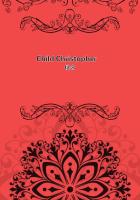but you see, Sally, it's very awkward having such grey hair, and feeling so young. Do you know, Sally, I've as great a mind for dancing, when Ihear a lively tune on the street-organs, as ever; and as great a mind to sing when I'm happy--to sing in my old way, Sally, you know." "Ay, you had it from a girl," said Sally; "and many a time, when the door's been shut, I did not know if it was you in the parlour, or a big bumble-bee in the kitchen, as was ****** that drumbling noise. I heard you at it yesterday." "But an old woman with grey hair ought not to have a fancy for dancing or singing," continued Miss Benson. "Whatten nonsense are ye talking?" said Sally, roused to indignation. "Calling yoursel' an old woman when you're better than ten years younger than me;and many a girl has grey hair at five-and-twenty." "But I'm more than five-and-twenty, Sally--I'm fifty-seven next May!" "More shame for ye, then, not to know better than to talk of dyeing your hair. I cannot abide such vanities!" "Oh dear! Sally, when will you understand what I mean? I want to know how I'm to keep remembering how old I am, so as to prevent myself from feeling so young? I was quite startled just now to see my hair in the glass, for I can generally tell if my cap is straight by feeling. I'll tell you what I'll do--I'll cut off a piece of my grey hair, and plait it together for a marker in my Bible!" Miss Benson expected applause for this bright idea, but Sally only made answer-- "You'll be taking to painting your cheeks next, now you've once thought of dyeing your hair." So Miss Benson plaited her grey hair in silence and quietness, Leonard holding one end of it while she wove it, and admiring the colour and texture all the time, with a sort of implied dissatisfaction at the auburn colour of his own curls, which was only half-comforted away by Miss Benson's information, that, if he lived long enough, his hair would be like hers. Mr. Benson, who had looked old and frail while he was yet but young, was now stationary as to the date of his appearance. But there was something more of nervous restlessness in his voice and ways than formerly; that was the only change five years had brought to him. And as for Sally, she chose to forget age and the passage of years altogether, and had as much work in her, to use her own expression, as she had at sixteen; nor was her appearance very explicit as to the flight of time. Fifty, sixty, or seventy, she might be--not more than the last, not less than the first--though her usual answer to any circuitous inquiry as to her age was now (what it had been for many years past), "I'm feared I shall never see thirty again." Then as to the house. It was not one where the sitting-rooms are refurnished every two or three years; not now, even (since Ruth came to share their living) a place where, as an article grew shabby or worn, a new one was purchased. The furniture looked poor, and the carpets almost threadbare;but there was such a dainty spirit of cleanliness abroad, such exquisite neatness of repair, and altogether so bright and cheerful a look about the rooms--everything so above-board--no shifts to conceal poverty under flimsy ornament--that many a splendid drawing-room would give less pleasure to those who could see evidences of character in inanimate things. But whatever poverty there might be in the house, there was full luxuriance in the little square wall-encircled garden, on two sides of which the parlour and kitchen looked. The laburnum-tree, which when Ruth came was like a twig stuck into the ground, was now a golden glory in spring, and a pleasant shade in summer. The wild hop, that Mr. Benson had brought home from one of his country rambles, and planted by the parlour-window, while Leonard was yet a baby in his mother's arms, was now a garland over the casement, hanging down long tendrils, that waved in the breezes, and threw pleasant shadows and traceries, like some old Bacchanalian carving, on the parlour-walls, at "morn or dusky eve." The yellow rose had clambered up to the window of Mr. Benson's bedroom, and its blossom-laden branches were supported by a jargonelle pear-tree rich in autumnal fruit. But, perhaps, in Ruth herself there was the greatest external change; for of the change which had gone on in her heart, and mind, and soul, or if there had been any, neither she nor any one around her was conscious; but sometimes Miss Benson did say to Sally, "How very handsome Ruth is grown!"To which Sally made ungracious answer, "Yes, she's well enough. Beauty is deceitful, and favour a snare, and I'm thankful the Lord has spared me from such man-traps and spring-guns." But even Sally could not help secretly admiring Ruth. If her early brilliancy of colouring was gone, a clear ivory skin, as smooth as satin, told of complete and perfect health, and was as lovely, if not so striking in effect, as the banished lilies and roses. Her hair had grown darker and deeper, in the shadow that lingered in its masses; her eyes, even if you could have guessed that they had shed bitter tears in their day, had a thoughtful, spiritual look about them, that made you wonder at their depth, and look--and look again. The increase of dignity in her face had been imparted to her form. I do not know if she had grown taller since the birth of her child, but she looked as if she had. And although she had lived in a very humble home, yet there was something about either it or her, or the people amongst whom she had been thrown during the last few years, which had so changed her, that whereas, six or seven years ago, you would have perceived that she was not altogether a lady by birth and education, yet now she might have been placed among the highest in the land, and would have been taken by the most critical judge for their equal, although ignorant of their conventional etiquette--an ignorance which she would have acknowledged in a ******, child-like way, being unconscious of any false shame. Her whole heart was in her boy. She often feared that she loved him too much--more than God Himself--yet she could not bear to pray to have her love for her child lessened. But she would kneel down by his little bed at night--at the deep, still midnight--with the stars that kept watch over Rizpah shining down upon her, and tell God what I have now told you, that she feared she loved her child too much, yet could not, would not, love him less; and speak to Him of her one treasure as she could speak to no earthly friend. And so, unconsciously, her love for her child led her up to love to God, to the All-knowing, who read her heart. It might be superstition--I dare say it was--but, some-how, she never lay down to rest without saying, as she looked her last on her boy, "Thy will, not mine, be done"; and even while she trembled and shrank with infinite dread from sounding the depths of what that will might be, she felt as if her treasure were more secure to waken up rosy and bright in the morning, as one over whose slumbers God's holy angels had watched, for the very words which she had turned away in sick terror from realising the night before. Her daily absence at her duties to the Bradshaw children only ministered to her love for Leonard. Everything does minister to love when its foundation lies deep in a true heart, and it was with an exquisite pang of delight that, after a moment of vague fear, ("Oh, mercy! to myself I said, If Lucy should be dead!") she saw her child's bright face of welcome as he threw open the door every afternoon on her return home. For it was his silently-appointed work to listen for her knock, and rush breathless to let her in. If he were in the garden, or upstairs among the treasures of the lumber-room, either Miss Benson, or her brother, or Sally would fetch him to his happy little task; no one so sacred as he to the allotted duty. And the joyous meeting was not deadened by custom, to either mother or child. Ruth gave the Bradshaws the highest satisfaction, as Mr. Bradshaw often said both to her and to the Bensons; indeed, she rather winced under his pompous approbation. But his favourite recreation was patronising; and when Ruth saw how quietly and meekly Mr. Benson submitted to gifts and praise, when an honest word of affection, or a tacit, implied acknowledgment of equality, would have been worth everything said and done, she tried to be more meek in spirit, and to recognise the good that undoubtedly existed in Mr. Bradshaw. He was richer and more prosperous than ever;--a keen, far-seeing man of business, with an undisguised contempt for all who failed in the success which he had achieved. But it was not alone those who were less fortunate in obtaining wealth than himself that he visited with severity of judgment; every moral error or delinquency came under his unsparing comment. Stained by no vice himself, either in his own eyes or in that of any human being who cared to judge him, having nicely and wisely proportioned and adapted his means to his ends, he could afford to speak and act with a severity which was almost sanctimonious in its ostentation of thankfulness as to himself. Not a misfortune or a sin was brought to light but Mr. Bradshaw could trace to its cause in some former mode of action, which he had long ago foretold would lead to shame. If another's son turned out wild or bad, Mr. Bradshaw had little sympathy; it might have been prevented by a stricter rule, or more religious life at home; young Richard Bradshaw was quiet and steady, and other fathers might have had sons like him if they had taken the same pains to enforce obedience. Richard was an only son, and yet Mr. Bradshaw might venture to say he had never had his own way in his life. Mrs. Bradshaw was, he confessed (Mr. Bradshaw did not dislike confessing his wife's errors), rather less firm than he should have liked with the girls; and with some people, he believed, Jemima was rather headstrong;but to his wishes she had always shown herself obedient. All children were obedient if their parents were decided and authoritative; and every one would turn out well, if properly managed. If they did not prove good, they might take the consequences of their errors. Mrs. Bradshaw murmured faintly at her husband when his back was turned;but if his voice was heard, or his foot-steps sounded in the distance, she was mute, and hurried her children into the attitude or action most pleasing to their father. Jemima, it is true, rebelled against this manner of proceeding, which savoured to her a little of deceit; but even she had not, as yet, overcome her awe of her father sufficiently to act independently of him, and according to her own sense of right--or rather, I should say, according to her own warm, passionate impulses. Before him the wilfulness which made her dark eyes blaze out at times was hushed and still; he had no idea of her self-tormenting, no notion of the almost southern jealousy which seemed to belong to her brunette complexion. Jemima was not pretty;the flatness and shortness of her face made her almost plain; yet most people looked twice at her expressive countenance, at the eyes which flamed or melted at every trifle, at the rich colour which came at every expressed emotion into her usually sallow face, at the faultless teeth which made her smile like a sunbeam. But then, again, when she thought she was not kindly treated, when a suspicion crossed her mind, or when she was angry with herself, her lips were tight-pressed together, her colour was wan and almost livid, and a stormy gloom clouded her eyes as with a film. But before her father her words were few, and he did not notice looks or tones. Her brother Richard had been equally silent before his father in boyhood and early youth; but since he had gone to be a clerk in a London house, preparatory to assuming his place as junior partner in Mr. Bradshaw's business, he spoke more on his occasional visits at home. And very proper and highly moral was his conversation; set sentences of goodness, which were like the flowers that children stick in the ground, and that have not sprung upwards from roots--deep down in the hidden life and experience of the heart. He was as severe a judge as his father of other people's conduct, but you felt that Mr. Bradshaw was sincere in his condemnation of all outward error and vice, and that he would try himself by the same laws as he tried others; somehow, Richard's words were frequently heard with a lurking distrust, and many shook their heads over the pattern son; but then it was those whose sons had gone astray, and been condemned, in no private or tender manner, by Mr. Bradshaw, so it might be revenge in them. Still, Jemima felt that all was not right; her heart sympathised in the rebellion against his father's commands, which her brother had confessed to her in an unusual moment of confidence, but her uneasy conscience condemned the deceit which he had practised. The brother and sister were sitting alone over a blazing Christmas fire, and Jemima held an old newspaper in her hand to shield her face from the hot light. They were talking of family events, when, during a pause, Jemima's eye caught the name of a great actor, who had lately given prominence and life to a character in one of Shakespeare's plays. The criticism in the paper was fine, and warmed Jemima's heart. "How I should like to see a play!" exclaimed she. "Should you?" said her brother listlessly. "Yes, to be sure! Just hear this!" and she began to read a fine passage of criticism. "Those newspaper people can make an article out of anything," said he, yawning. "I've seen the man myself, and it was all very well, but nothing to make such a fuss about." "You! you seen----! Have you seen a play, Richard? Oh, why did you never tell me before? Tell me all about it! Why did you never name seeing ----in your letters?" He half smiled, contemptuously enough. "Oh! at first it strikes one rather, but after a while one cares no more for the theatre than one does for mince-pies." "Oh, I wish I might go to London!" said Jemima impatiently. "I've a great mind to ask papa to let me go to the George Smiths', and then I could see ----. I would not think him like mince-pies." "You must not do any such thing!" said Richard, now neither yawning nor contemptuous. "My father would never allow you to go to the theatre; and the George Smiths are such old fogeys--they would be sure to tell." "How do you go, then? Does my father give you leave?" "Oh! many things are right for men which are not for girls." Jemima sat and pondered. Richard wished he had not been so confidential. "You need not name it," said he, rather anxiously. "Name what?" said she, startled, for her thoughts had gone far afield. "Oh, name my going once or twice to the theatre!" "No, I shan't name it!" said she. "No one here would care to hear it." But it was with some little surprise, and almost with a feeling of disgust, that she heard Richard join with her father in condemning some one, and add to Mr. Bradshaw's list of offences, by alleging that the young man was a playgoer. He did not think his sister heard his words.Mary and Elizabeth were the two girls whom Ruth had in charge; they resembled Jemima more than their brother in character. The household rules were occasionally a little relaxed in their favour, for Mary, the elder, was nearly eight years younger than Jemima, and three intermediate children had died. They loved Ruth dearly, made a great pet of Leonard, and had many profound secrets together, most of which related to their wonders if Jemima and Mr. Farquhar would ever be married. They watched their sister closely; and every day had some fresh confidence to make to each other, confirming or discouraging to their hopes. Ruth rose early, and shared the household work with Sally and Miss Benson till seven; and then she helped Leonard to dress, and had a quiet time alone with him till prayers and breakfast. At nine she was to be at Mr.
同类推荐
热门推荐
张天的传奇人生
一个生活在平凡世界的都市少年,由于天生体弱多病。在他九岁那年偶遇一位老者,老者教他异能术。由于他的体内不知何时存在着一股很邪恶的力量,而且这股力量要比老者的力量强上许多。最终老者费了很大力气才最终将那股神秘力量封印。后来由于某些原因,张天放弃使用异能力量,然而悲剧性的是他的母亲还是死在了恶人手中,最终他决定放弃他的承诺—一辈子不使用异能术,最终和恶势力进行了较量,随着渐渐地深入他发现了一个惊人的秘密。。。。。。。原来黄衣人是。。。。原来黑衣人是。。。。。原来那个善良的女孩也是。。。。。。原来这一切的一切都是一个阴谋。。。。原来这一切的一切都是命中注定。。。。主人公命运如何,敬请期待!!!!QQ963598335















